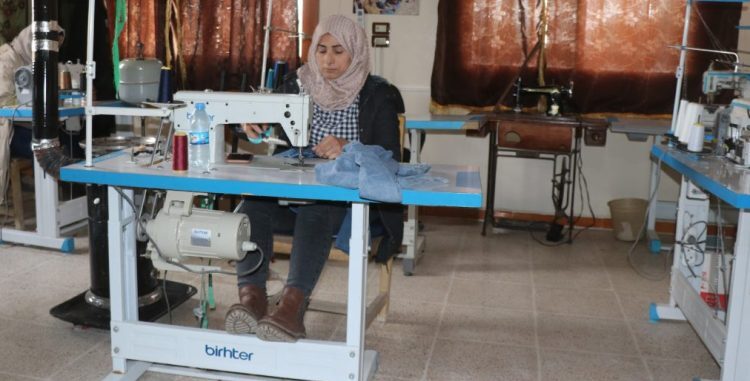Khalat joined a sewing training course organized by the Foundation of the Free Women in Syria in the city of Qamishli, northeastern Syria, four years ago. She learned the profession and then landed a job within a sewing workshop affiliated with the Foundation.
“I got a job opportunity in the workshop after mastering the profession, and I am now the supervisor of the sewing workshop in addition to working here,” Khalat told North Press.
Since its establishment in 2014, the Foundation has been seeking to enhance women’s role in society and economically empower them. To achieve this, the organization has provided projects and training workshops.
Economic empowerment
The organization specifically focuses on supporting uneducated women and those who face challenges in securing job opportunities due to a lack of formal education and skills.
“The Foundation seeks to build women’s capacities and economically empower them through training courses and workshops targeting hundreds of women annually,” Roken Khisho, an administrator at the NGO, told North Press.
The Foundation has opened branches in the cities and towns of Hasakah, Derbasiyah, Girke Lege (Maabadeh), Derik (al-Malikiyah), and Chel Agha (al-Jawadiyah), as well as in IDP and refugee camps such as Hawl, Roj, and Washokani, all located in northeastern Syria. It has opened other offices in the cities of Raqqa, Tabqa, and Kobani, northern Syria.
Organizational committees
The Foundation coordinates its operations through several committees. They include the Health Committee, Training and Rehabilitation Committee, Legal Committee, Projects Committee, and Diplomatic Committee. Each committee works on addressing practical and theoretical aspects.
The theoretical aspect includes organizing awareness lectures and campaigns for women within communes, houses, and institutions. Furthermore, the Foundation holds sessions to familiarize women with their rights and provide them with psychological and moral support, Khisho said.
On the other hand, the committees work on the practical aspect by implementing projects. The Projects Committee begins by conducting surveys among women to gather information and insights. Based on the survey results, the committee identifies projects to be implemented, aligning them with the specific needs of the women involved.
Khisho noted that the projects are implemented according to the available resources.
She clarified that the Foundation operates as a civil society organization and receives funding from both local and international humanitarian and charitable organizations. This funding is facilitated through its diplomatic committee, which collaborations with these supporting organizations. In total, the Foundation has made partnerships with nearly 50 organizations that provide financial support for its initiatives.
The Health Committee has implemented various projects, including the establishment of clinics in Hasakah, Kobani, Qamishli, and the village of al-Tabka in Qamishli countryside.
In addition, a mobile clinic provides medical care to residents of Derik and its surrounding villages, staffed by a pediatrician, a gynecologist, and a nurse.
The clinic aims to target women who cannot afford the costs of treatment in private clinics. Medical consultations and medications are provided for free.
Training courses and job opportunities
Through the Foundation’s offices, the Training and Rehabilitation Committee organizes training courses in sewing, wool knitting, hairdressing, first aid, computer skills, languages, and handicrafts in various areas of northeastern Syria, including camps.
In addition, the committee organizes literacy courses for women in both Arabic and Kurdish languages, and works on establishing kindergartens for the children of women enrolled in the trainings, in addition to providing psychological support for children, especially displaced ones.
The Foundation’s branch in Qamishli includes a sewing workshop, a knitting workshop, a store, and a women’s gym.
However, such workshops have not been opened in other areas due to lack of funding.
Khisho emphasized that upon completion of the training courses, the Foundation seeks to provide job opportunities for women. Some of them are employed in the Foundation’s workshops as needed. As for the others, the foundation coordinates with the Women’s Economic Office and the Economy Board, both affiliated with the Autonomous Administration of North and East Syria (AANES), to secure job opportunities for them.
Regarding some urgent humanitarian cases, the Foundation provides sewing machines free of charge for poor women, especially widows.
“We provide training to beginner girls and women who have an interest in learning the profession at affordable prices. The number of training workshops conducted per year varies, typically ranging from four to five, depending on the number of applicants,” Khalat added to North Press.
She highlighted that most women who express interest in sewing but struggle to find job opportunities are either uneducated or lack the necessary certificates and experience to work in public institutions or private companies.
The workshop, consisting of four workers, makes various types of clothing and fulfills requests for some institutions, such as school uniforms.
The workshop also offers services for sewing traditional costumes specifically tailored for special occasions like Newroz and International Women’s Day.
“We are three female workers in the knitting workshop, knitting clothes for children, women, and men. The Foundation always provides us with assistance and support,” said Viyan Ali, who works on a knitting machine.
“We participate in exhibitions organized by some institutions such as the Culture Board [of the AANES], where we showcase our products which include clothes, handicrafts, and items made of wool,” she added.
“We have two handicraft workshops for women, one in Raqqa and the other in Kobani. They participate alongside us in the exhibitions and showcase their work.”
Viyan trains women who are interested in learning how to knit woolen clothes using knitting machines, aiming to help them get job opportunities in the future.
The products of the Foundation’s workshops are marketed and sold through stores affiliated with the Foundation in Qamishli, Kobani, and Girke Lege, at reasonable prices compared to the market prices, according to Khisho.

